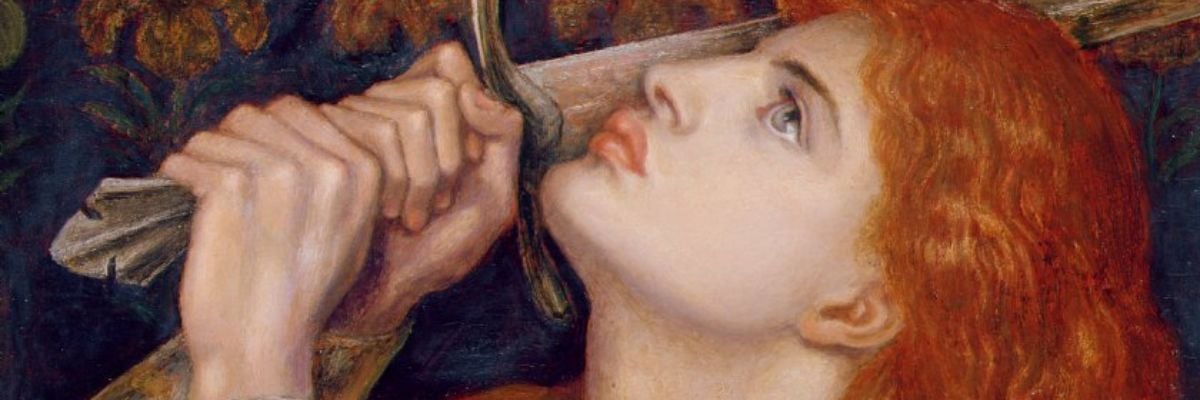
Mark Twain considered his biography of Saint Joan of Arc, whose feast we celebrate today, to be his best work. He called the Maid of Orleans “easily and by far the most extraordinary person the human race has ever produced.” The story of St. Joan is well known by Catholics and non-Catholics alike, but we may be surprised to learn just how well it is known: There may be no medieval figure whose life is better documented than that of Saint Joan of Arc.
The story of her life and of her liberation of France from the English had survived for centuries as a kind of French national myth, but it was, in fact, only during Twain’s adolescence that the French historian and archeologist Jules Étienne Quicherat collected the official documents from Joan’s trial and rehabilitation and rendered them into five volumes of, as Twain puts it “lucid and understandable modern French.” We can only imagine the effect on medieval scholars and on the faithful of France, when these documents verified to the modern world the myth that had fired the hearts of Frenchmen for generations.
Quicherat’s volumes provide layer upon layer of corroboration of the remarkable events of her short life, all given, as Twain points out, under oath. Twain insists that there is no other life “of that remote time” that is “known with either the certainty or the comprehensiveness that attaches to hers.” Either the details of Joan’s life are true, or her story is a centuries-long conspiracy to create a national heroine the likes of which we find nowhere else in history.
Saint Joan has captured the imagination of novelists, playwrights, historians, and filmmakers, some coming closer to the truth than others.
And then there are the outright distortions. In Joan some see a feminist, an interpretation that ignores, among other things, her desire to consecrate her virginity. Joan was no feminist. Of her, G.K. Chesterton wrote, “It was exactly the sort of person, like Joan of Arc, who did know why women wore skirts, who was most justified in not wearing one.”
Her motives were never to make it big in a man’s world. Indeed, she tried to refuse her mission. Once the Dauphin had been crowned she sought to return to her life in Domrémy. Her childhood was altogether feminine, one given to training in the art of making a home: “In sewing and spinning I fear no woman,” she insisted at her trial.
Not only was Joan decidedly domestic, she exhibited none of the sexual license of the feminist. Testimony from the soldiers and officers with whom she shared close quarters describe her modesty and its influence on their own behavior. Upon joining the French Army, one of her first acts was to chase the prostitutes from the camp with her sword. George Bernard Shaw describes this act as prudery; it is a charge typical from quarters that cannot understand the vow of a virgin. Joan’s soldiers, however, understood, and her heroic virtue, inspired them to love and follow her.
Joan as proto-protestant, another distortion from Shaw, does not accord with the testimony. She loved the Church and her sacraments. Also among her first acts as commander was establishing the practice of Mass attendance and frequent reception of the sacraments among her soldiers. There is nothing in her testimony that contradicts Church teaching, and all throughout her trial she defends the authority of the Pope, requesting more than once to be referred to his judgment. Moreover, Joan may well have dictated a letter to the Hussites in Bohemia condemning their utraquism, likening them to “Saracens,” and warning them of God’s terrible judgment on heretics.
There are other errors about Joan: that she was a nationalist and a heroine of the working classes, an early revolutionary toppling the old feudal order. If these were truly Joan’s motives, why did she all but drag the Dauphin to his coronation? Why did she so desperately desire to leave behind the political world of Charles’s court and return to peasant life?
It is commonly believed that the Church reveres Joan as a martyr. She is not. Her sainthood derives from her piety, her devotion, and her charity, and above all, as Fr. Thurston notes, her willingness to imitate the Blessed Virgin in accepting the will of God and letting nothing get in the way of that will no matter how improbable it seemed.
Most improbable, of course, is the thought of a teenage farm girl with no military training leading an army, yet her battlefield successes, and more than these, her central role in a military campaign that changed the course of the Hundred Years War, are incontrovertible facts. These she accomplished at the age of 19, the youngest person ever to command a nation’s Army, and not as a mere figurehead or cheerleader but as an actual battlefield commander, who took charge of the strategic and tactical employment of her force. She discharged what may well be the most important role of a commander. She restored morale to the French Army and kept it high, largely by insisting that her soldiers conduct themselves like Christians, and also by taking her place at the vanguard of the assault.
But Joan did more than that. According to the testimony of the captains who served alongside her, Joan was a skilled tactician. “Except in matters of war” spoke one captain from Chartres at her rehabilitation, “she was simple and innocent. But in the leading and drawing up of armies and in the conduct of war, in disposing an army for battle and haranguing the soldiers, she behaved like the most experienced captain in the world, like one with a whole lifetime of experience.”
The Duke of Alençon corroborates this testimony:
“In the conduct of war she was most skillful, both in carrying the lance herself, in drawing up the army in battle order and in placing the artillery. And everyone was astonished that she acted with such prudence and clear-sightedness in military matters as cleverly as some great captain with twenty or thirty years experience; and especially in the placing of artillery, for in that she acquitted herself magnificently.”
Joan’s extraordinary skill as a commander was not limited to her tactical ability. She also understood political strategy. After raising the siege at Orleans, the Dauphin and his advisors favored an invasion of Normandy. Joan convinced them that clearing the way to Rheims and having Charles anointed king would demoralize the English and rally the will of the French people to stay in the fight. Her plan led to the eventual French victory.
To this day, however, some say that her actions were not decisive in bringing about the end of the war. The question seems reasonable. After all, it was more than 30 years after Joan’s execution that the French achieved victory. Nonetheless, for the Christian, the question seems almost impertinent. God sent Joan to rid France of the English. Providence’s schedule is not mankind’s. That God chose to take another three decades to bring Joan’s work to fruition is his business.
Skeptics, cynics, debunkers, and other nonbelievers look for other causes for the conclusion of the war. It is true that England did recapture a good many of the losses suffered during the revival under Joan. Furthermore, England’s loss of revenue due to agricultural depression and a decline in overseas trade reduced her capacity to wage war.
Eduourd Perroy, whose history of the Hundred Years War is widely regarded as authoritative, seems conflicted on the question. At one point he writes: “So the sacrifice of the Maid, though it heralded decisive victory, did so only remotely. Did she exercise that essential influence on the course of events that is always attributed to her? It is permissible to doubt it.” In the same work, however, he writes,
All that the heroine left behind her were actions. But they were actions whose imprint no condemnation could efface. There was the military fact that for the first time the Lancastrian arms were halted on the road to victory. There was the political fact that the King … was given the prestige of coronation. In this way Joan of Arc’s intervention was decisive, and the page she wrote, contrary to all expectation, in the history of France deserves to be remembered as one of the finest.
Historian General J.F.C. Fuller, himself a nonbeliever, sees Joan as clearly decisive noting the effect of the raising of the siege of Orleans on French confidence. The unstoppable English had been stopped.
A further effect of the victory at Orleans was the uniting of French nobles who had been indecisive on the question of whether or not to back the Dauphin. They now came forward and rallied to the Valois cause. One such, the duke of Brittany sent Joan a letter declaring his alliance to Charles. Joan wrote back to the Duke scolding him for waiting so long.
Another way we might evaluate the extent to which Joan was responsible for an ultimate French victory would be to try to gauge to what extent Joan was responsible for bringing about a resolution to the French civil war between Armagnacs and Burgundians, a question, as far as I know, underexplored by historians. We do know that Joan wrote a letter to the Duke of Burgundy at the time of the coronation at Rheims. Although he did not attend, it is not unreasonable to suppose that Burgundy may have decided that his better fortunes lay with a France increasingly united under the patriotic myth of Saint Joan.
Revisionist killjoys today like to fuss over whether the battle at the Alamo was decisive, or whether Washington’s crossing at Trenton was decisive. Such questions are boring. The myths of the Alamo and Trenton, like those of Lepanto or Thermopylae, fire the soul of a nation. “The inspired generalship of the Lorraine Peasant girl,” as Monsignor Philip Hughes describes it, was decisive and in many ways that cannot necessarily be measured with a casualty count. Saint Joan is France’s greatest myth, indeed one of Christendom’s. And her myth also happens to be true.
What is in Joan’s story for us? To be sure, her story drives home the merits of obedience, of trust in God, of fortitude, of perseverance, and the like.
There is also a truth all too easily missed in a modern nation where mobility is celebrated, rootlessness is the norm, and land means little more than a mortgage on a sphere of consumption. It is this: God loves particular places such as France and particular people such as the French. He also loves the Lorraine and Domrémy, and he wants us to be attached to our unique part of the world, wherever it may be. This kind of attachment is true patriotism, and it stands in contrast to the false globalism that informs so much of modern political discourse.
It says something to us that a great saint accomplished so much in defense of a unique people, of their land, and of their blood. Perhaps the revolutionary aspirations of universal empire are not part of the Divine plan. Rather, the little spot of land on which we all happen to live is the place designed for us on which to work out our salvation. When images of planet Earth from outer space, and the intensity of modern electronic communications make our own little villages seem small to the point of insignificance, we can reflect on what St. Joan fought and died for and give thanks to God for our own blood and soil.
This reflection on one of the saints most dear to the author also appeared at Crisis.com.
For the author’s account of the heroic life of St. Joan that appeared in This Rock, visit here.



